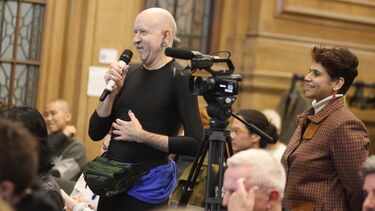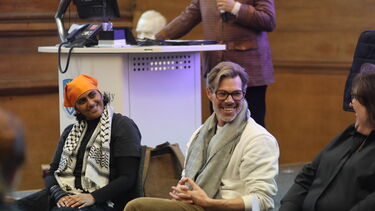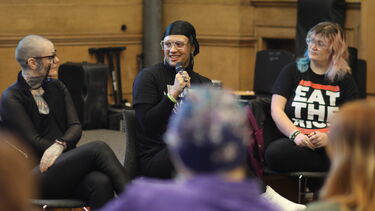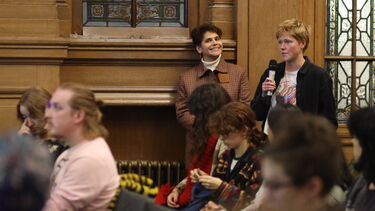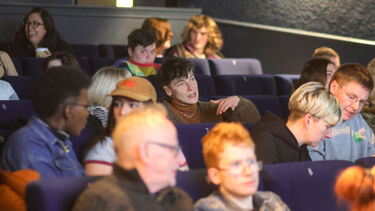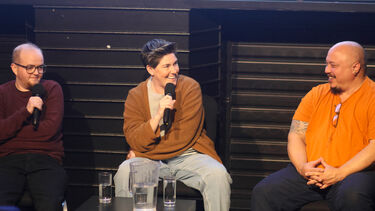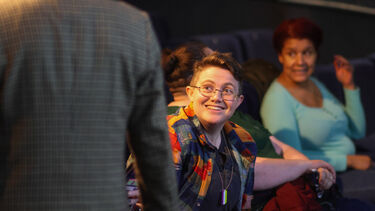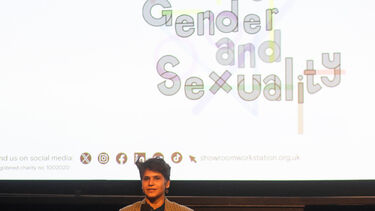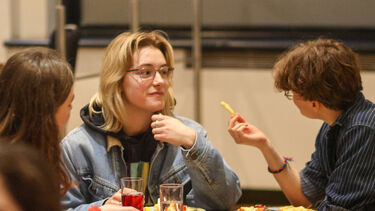Lectures on Gender and Sexuality
Find out about what our 'Lectures on Gender and Sexuality' involve, including upcoming and previous events. Take part in delivering a talk or join us at our upcoming events.
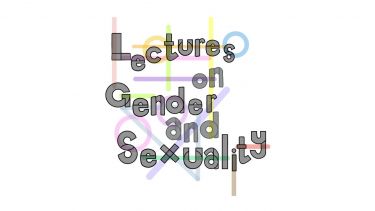
About the Lectures on Gender and Sexuality
In a world where questions of gender and sexuality constantly cause moral panic, the lectures seek to inform public opinion through research led findings. The series hosts 4 lectures every academic year, 2 per term, and invites scholars working on gender and sexuality issues across the globe and across various disciplines.
A beautiful visual archive builds alongside as each lecture is accompanied by a handmade poster depicting the central theme of the talk. Additionally, a book display showcases other books on the topic.
You are able to book onto our events to deliver a talk or attend a public lecture.
Since the start of the new lecture series, we have added new resources to the library collection.
Watch our three teaser videos below:
Join in
Staff and students at the university and members of the public (where the lecture is public) are very welcome to attend the talks. For further information contact Dr Surabhi Shukla via genderandsexuality@sheffield.ac.uk or book through our upcoming events section.
If you would like to hear about all our events please sign up to the research events email notifications to find out what's going on in The School of Law.
If you would like to deliver a talk based on our Lectures on Gender and Sexuality series please email us via genderandsexuality@sheffield.ac.uk
Previous events
October 2025: Drag and the Law
Panelists: Jason Finch, King Confuza, Nefarious DeVile, Harddeep Singh, and Dr. Rosie Fox
The Law & Drag event was truly inspiring as we heard powerful personal journeys from drag artists, as they reflected on how the law has and has not protected drag performers. The discussion touched on key themes such as accessibility, sexual assault, and interactions with law enforcement.
We were also joined by Dr Rosie Fox from the University of Leeds, who works on “Law’s a Drag,” a project that connects drag artists and academics to amplify their voices and experiences.
It was an evening of learning, laughter, and liberation, reminding us that the law, like drag, is ever-evolving.
November 2024- TOPS Screening
Speaker - A film by Ames Pennington
Self-proclaimed future award winning documentary filmmaker Ames Pennington presented their landmark documentary series TOPS on the question that defines trans masc experience in the UK today... “What TOP did you wanna wear after TOP surgery?” TOPS gave space to the experience of top surgery, and those that have it, without being another sad or gory story.
April 2024 - With the Clothes on our Backs and a Song on our Lips: Courting Queer Love in India
Speaker - Surabhi Shukla
Same sex marriages are not legal in India, yet a rich archive of evidence shows that couples, primarily queer women, have utilised the theatre of law, the very institution that denies them this option, to execute marriage affidavits with each other. This talk looks at some of those affidavits to discuss the fears and hopes of these unions and in doing hopes to show how lives are forged together outside of legal limitations.
February 2024 - Poetry, Prejudice and Parenting: A Lyrical Journey Through Law
Speaker - Katie Jukes, Senior Lecturer, Manchester Metropolitan University, with SJ Cooper-Knock and Surabhi Shukla
Using a creative lens, this talk explored ways in which the English legal system marginalises queer parenthood. Through re-writing legal texts and subverting legal language via poetry and music, Katie offered a different way to experience the law.
November 2023 - Trans History Through Colonial Photography in British India (1860-1890)
Speaker - Dr Gee Semmalar, Max Weber Fellow, European University Institute
Dr Semmalar's talk based on archival research focussed on the colonial development of ethnographic photography in British India from the mid 1850s to 1890s. By drawing on transnational histories of the empire, the talk covered the production of gender deviance through visual codes of caste.
October 2023 - Feeling Pain and Shame: Mapping the Emotional Grammar of Banning Conversion Therapy
Speaker - Dr Senthorun Raj, Reader at Manchester Metropolitan University
Dr Sen Raj's lecture on ‘conversion therapy’ charted the historical development of ‘conversion therapy’ in the West by examining logics of pain and shame and then reflected on the affective landscape of the statements made by legislators and public figures who engage in the debate to ban ‘conversion therapy.’
We were left with answering the rather large question: can a criminal law banning ‘conversion therapy’ remedy the pain and shame caused by homophobia, transphobia, and queerphobia? Even more, can it bring an end to these phobias? If not, how might we still take recourse to the law to challenge the harms of ‘conversion therapy’?
- April 2023 - ‘Only Hope’ for the Family’s Capital Building Business? Queer Chinese One-Child Generation Daughters' Reflection on their Upbringings and Identity Formation
Speaker - Scarlett Yee-man Ng, DPhil Candidate, Department of Sociology (Oxford)
Scarlett's lecture presented preliminary findings from her ongoing doctoral research. She is studying the intimate relationships of queer women migrants from the Chinese one-child generation.
In her lecture, Scarlett focused on the pre-migration lives of her 39 participants and analysed their growing-up stories, focusing specifically on their conceptions of sexuality and love through family upbringing and the role of sexuality in the migration decision.
Scarlett discovered that the complex entanglement of the one-child policy, class, intimacy, sexuality, and migration produced four distinct types of daughterhood: the privileged daughter, the unwanted daughter, the anxious daughter, and the neglected daughter.
- February 2023 - Inhuman Treatment, Bodily Integrity or an ‘Untouchable Legal Bubble’? Exploring the Spatio-Temporal Disjunctures of Intersex Rights
Speaker - Dr Kay Lalor, Reader, Manchester Metropolitan University
In the first lecture, Dr Kay Lalor traversed the UK and European legal terrain on intersex rights to demonstrate law’s deference to the medical profession in the treatment of intersex bodies.
Non therapeutic interventions on intersex infants, or ‘gender normalizing surgery’ often begins at birth and is repeated over the course of an intersex person’s life. These repeated interventions can cause continuing physical and psychological harm, which human rights protections as they are currently written and interpreted are not equipped to address.
This is because the law’s remedying force is typically concentrated on discreet incidents of harm. A radical reimagining of the concept of harm over time is required if human rights law hopes to assist intersex people.



